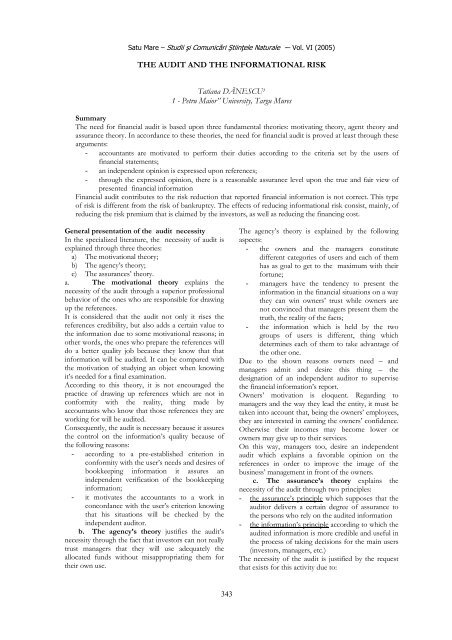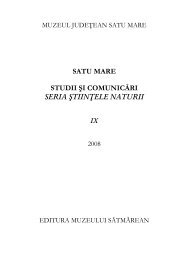Referenţi ştiinţifici - Muzeul Judeţean Satu Mare
Referenţi ştiinţifici - Muzeul Judeţean Satu Mare
Referenţi ştiinţifici - Muzeul Judeţean Satu Mare
Create successful ePaper yourself
Turn your PDF publications into a flip-book with our unique Google optimized e-Paper software.
<strong>Satu</strong> <strong>Mare</strong> – Studii şi Comunicări Ştiinţele Naturale -– Vol. VI (2005)<br />
THE AUDIT AND THE INFORMATIONAL RISK<br />
Tatiana DĂNESCU 1<br />
1 - Petru Maior” University, Targu Mures<br />
Summary<br />
The need for financial audit is based upon three fundamental theories: motivating theory, agent theory and<br />
assurance theory. In accordance to these theories, the need for financial audit is proved at least through these<br />
arguments:<br />
- accountants are motivated to perform their duties according to the criteria set by the users of<br />
financial statements;<br />
- an independent opinion is expressed upon references;<br />
- through the expressed opinion, there is a reasonable assurance level upon the true and fair view of<br />
presented financial information<br />
Financial audit contributes to the risk reduction that reported financial information is not correct. This type<br />
of risk is different from the risk of bankruptcy. The effects of reducing informational risk consist, mainly, of<br />
reducing the risk premium that is claimed by the investors, as well as reducing the financing cost.<br />
General presentation of the audit necessity<br />
In the specialized literature, the necessity of audit is<br />
explained through three theories:<br />
a) The motivational theory;<br />
b) The agency’s theory;<br />
c) The assurances’ theory.<br />
a. The motivational theory explains the<br />
necessity of the audit through a superior professional<br />
behavior of the ones who are responsible for drawing<br />
up the references.<br />
It is considered that the audit not only it rises the<br />
references credibility, but also adds a certain value to<br />
the information due to some motivational reasons; in<br />
other words, the ones who prepare the references will<br />
do a better quality job because they know that that<br />
information will be audited. It can be compared with<br />
the motivation of studying an object when knowing<br />
it’s needed for a final examination.<br />
According to this theory, it is not encouraged the<br />
practice of drawing up references which are not in<br />
conformity with the reality, thing made by<br />
accountants who know that those references they are<br />
working for will be audited.<br />
Consequently, the audit is necessary because it assures<br />
the control on the information’s quality because of<br />
the following reasons:<br />
- according to a pre-established criterion in<br />
conformity with the user’s needs and desires of<br />
bookkeeping information it assures an<br />
independent verification of the bookkeeping<br />
information;<br />
- it motivates the accountants to a work in<br />
concordance with the user’s criterion knowing<br />
that his situations will be checked by the<br />
independent auditor.<br />
b. The agency’s theory justifies the audit’s<br />
necessity through the fact that investors can not really<br />
trust managers that they will use adequately the<br />
allocated funds without misappropriating them for<br />
their own use.<br />
343<br />
The agency’s theory is explained by the following<br />
aspects:<br />
- the owners and the managers constitute<br />
different categories of users and each of them<br />
has as goal to get to the maximum with their<br />
fortune;<br />
- managers have the tendency to present the<br />
information in the financial situations on a way<br />
they can win owners’ trust while owners are<br />
not convinced that managers present them the<br />
truth, the reality of the facts;<br />
- the information which is held by the two<br />
groups of users is different, thing which<br />
determines each of them to take advantage of<br />
the other one.<br />
Due to the shown reasons owners need – and<br />
managers admit and desire this thing – the<br />
designation of an independent auditor to supervise<br />
the financial information’s report.<br />
Owners’ motivation is eloquent. Regarding to<br />
managers and the way they lead the entity, it must be<br />
taken into account that, being the owners’ employees,<br />
they are interested in earning the owners’ confidence.<br />
Otherwise their incomes may become lower or<br />
owners may give up to their services.<br />
On this way, managers too, desire an independent<br />
audit which explains a favorable opinion on the<br />
references in order to improve the image of the<br />
business’ management in front of the owners.<br />
c. The assurance’s theory explains the<br />
necessity of the audit through two principles:<br />
- the assurance’s principle which supposes that the<br />
auditor delivers a certain degree of assurance to<br />
the persons who rely on the audited information<br />
- the information’s principle according to which the<br />
audited information is more credible and useful in<br />
the process of taking decisions for the main users<br />
(investors, managers, etc.)<br />
The necessity of the audit is justified by the request<br />
that exists for this activity due to:




